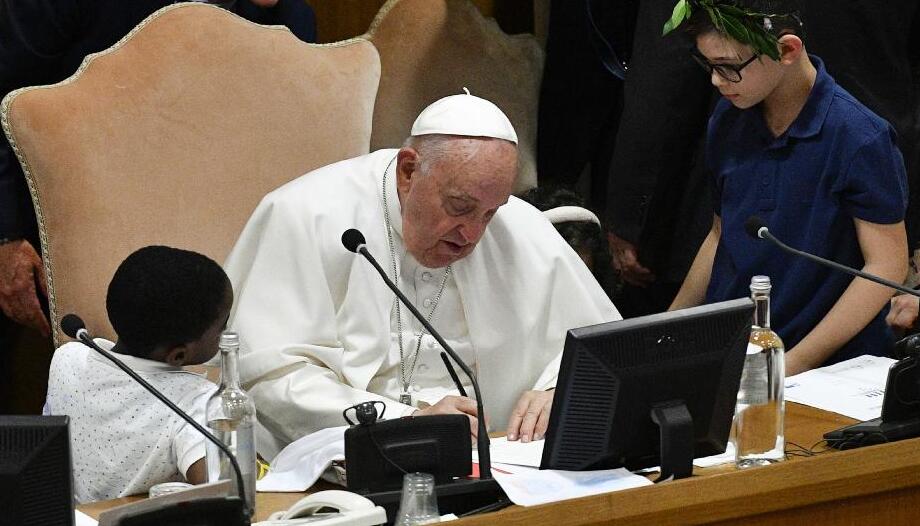The II World Meeting on Human Fraternity, under the motto #BeHuman, is being the focus of attention this weekend at the Vatican. The Holy Father Francis received in audience on Saturday morning the participants in the meeting, organized by the Fratelli tutti Foundation, and also participated in the round table "Children, generation of the future", in which he placed the future of humanity in children and the elderly".
At the Audience, the Holy Father said. "I welcome you and thank you for being here, coming from many parts of the world, for the World Meeting on Human Fraternity. I thank the Fratelli tutti Foundation, which aims to promote the principles enunciated in the encyclical, 'to arouse around St. Peter's Basilica and the embrace of its colonnade initiatives related to spirituality, art, education and dialogue with the world' (Quirografo, December 8, 2021).
Luther King: "We have not learned the art of living together".
The Pope then pointed out that "on a planet in flames, you have come together to reaffirm your 'no' to war and your 'yes' to peace, bearing witness to the humanity that unites us and makes us recognize each other as brothers, in the mutual gift of our respective cultural differences".
"In this regard," Francis recalled in the presence of the Nobel Peace Laureates, "the words of a famous speech by Martin Luther King come to mind when he said: 'We have learned to fly like birds, to swim like fish, but we have not yet learned the simple art of living together as brothers' (Martin Luther King, Speech on the occasion of the awarding of the Nobel Peace Prize, 11 December 1964). So it is.
"And so we ask ourselves: how can we, concretely, return to the art of a
truly human coexistence? First of all, the Pope took up "the key attitude proposed in Fratelli tutti: compassion, commenting on the parable of the Good Samaritan.
Recognizing our common humanity
He then exhorted those present "to go forward in your work of silent sowing" of some proposals, centered on the dignity of the human person, to build good policies, based on the principle of fraternity, which "has something positive to offer to freedom and equality" (Fratelli tutti, 103). From it can emerge a 'Charter of the human', which includes, along with rights, also behaviors and practical reasons for what makes us more human in life".
He also encouraged them "to make this spirituality of fraternity grow and to promote, through your diplomatic action, the role of multilateral bodies. War is a deception, as is the idea of international security based on the deterrence of fear.
"To ensure lasting peace, we must return to the recognition of our common humanity and fraternity at the heart of the life of peoples. Only in this way will we succeed in developing a model of coexistence capable of giving the human family a future. Political peace needs peace of hearts, so that people can meet with the confidence that life always triumphs over every form of death," he added.
"Declaration of the Children's Fraternity".
The Pope also spoke at the round table "Children, the generation of the future" in the New Hall of the Vatican City Synod, and assured that "one thinks that the future of humanity is in adults who can do this, that, the other... But it is not so. The future of humanity is at both ends: it is in the children and in the elderly".
"When children meet grandparents. And this is a beautiful thing, and we have to take care of the elderly, grandparents and children," Francis noted. "And that will be the future, because grandparents give us wisdom, and children learn wisdom from grandparents. Grandparents have a past that gives us a lot, children have a future that receives from the past. And that's why I think it's very important to help children to grow, to develop."
"It's not the children's fault that there is war."
In the conversation, the Pontiff stressed that "when we make peace, we are happy" and stressed the need to "be together: this is true, because being friends, playing together, studying together gives us the happiness of the community". [...] "Those children sometimes don't have food, they are afraid of bombs, of bad things... But if one child is on this side of the war, and another on this side of the war - listen to the question - are they enemies?" he asked. "It's not their fault that there is war."
At the event, the "Declaration of the Fraternity of Children" was read by the Holy Father and children from all over the world. The event is part of the preparation for the First World Children's Day, to be held May 25-26 in Rome and the Vatican, when more than 70,000 children and their companions are expected to come to the Olympic Stadium, as announced by Father Enzo Fortunato, coordinator of the event.








